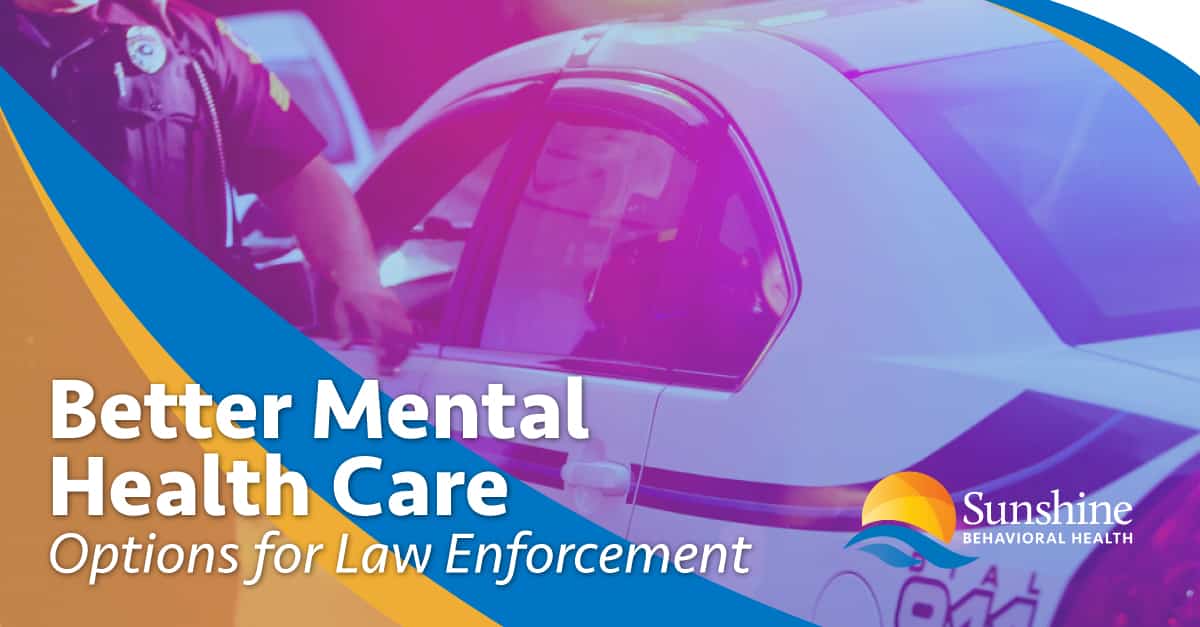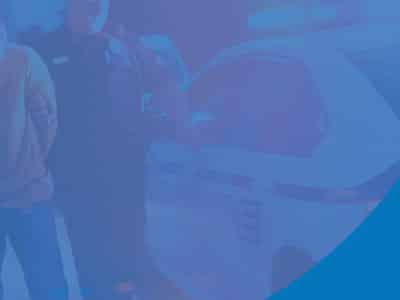Police officers are on the frontlines every day keeping our streets safe. The stresses that come with being in law enforcement are hard for people to grasp. Risking your life every day and for some, living through traumatizing experiences, can pay a toll on the mental health of our law enforcement officers.
Anyone can experience common mental health problems such as anxiety, depression, stress, and trauma due to a genetic predisposition or environment. First responders, such as people in law enforcement, face more than their fair share but are less likely to avail themselves of rehab services.
Law Enforcement and Mental Health
Shooting at a human being is different from firing at a target. Officers can face post-traumatic stress disorder (PTSD)—also suffered by soldiers from combat zones, domestic violence victims, and survivors from automobile accidents—as well as other mental health issues. And killing someone takes a toll on everyone.
It’s not just the possibility of taking a life that affects law enforcement’s mental or physical health. Other factors include:
Work hours and schedules. Physicians warn that when we don’t have consistent sleep routines, the body and mind can suffer. Law enforcement officers sometimes have wildly fluctuating start times from week to week. It makes it difficult to sleep at the same time daily or to meet with friends and family.
Getting injured and seeing other people injured or killed. It takes something out of people to see an accident or a physical confrontation, whether they are personally involved or not.
Being under scrutiny. Everyone has a supervisor or employer who judges their performance, but police are being judged by everybody: fellow officers, superiors, politicians, and the public. They also often get the benefit of the doubt from juries and courts, but the time under the microscope is taxing. And everyone now has a video camera in their pockets to document events selectively. It’s false to assume the camera can’t lie, deliberately or inadvertently.
So, it’s not surprising that law enforcement professionals in general have more mental health issues than the general population. According to a 2017 study from the Ruderman Family Foundation, police:
- Commit suicide more often than they are killed on duty.
- Experience PTSD and depression five times as often.
- Avoid seeking counseling for suicidal thoughts or other mental health issues because they are ashamed of seeming weak and maybe losing their jobs.
That fear seems unfounded. Police seeking mental health services already have their privacy protected, officially. Some still report that their careers were derailed when it was learned that they were getting counseling.
Some of the most common mental health disorders experienced by law enforcement personnel include:
PTSD And Other Mental Health Problems
Post-traumatic stress disorder (PTSD). Sometimes called post-traumatic stress injury (PTSI), this condition manifests in at least three different ways and are not exclusive:
- Flashbacks. When the individual relives the experience, triggered by a loud noise, an image, or other stimuli. The individuals feel like they are back in the same situation down to physical sensations, thoughts, and emotions. These flashbacks may even occur while sleeping in the form of recurring nightmares.
- Hyperarousal. The individuals are on edge, expecting something to happen at any time, making them angry, nervous, tense, and have a hard time sleeping.
- Avoidance. Having tried and failed to repress flashbacks and suppress hyperarousal, these individuals instead try to avoid anything that might trigger them: people, places, situations. They may also try to suppress them by abusing alcohol or drugs.
In early 2019, The Wisconsin legislature considered a bill to give first responders with PTSD a guaranteed 32 weeks of worker’s compensation, but it did not pass.
Law enforcement personnel also are at higher risk of:
- Anxiety disorders. A class of disorders that include obsessive-compulsive disorder, panic disorders, phobias, sleeping and eating disorders, social anxiety, and substance use disorders.
- Depression. In the medical sense, depression is a feeling of utter hopelessness, that nothing is worth doing or will make any difference. Individuals with depression may feel guilty for being depressed, that their lives aren’t so bad.
Either way, they may attempt suicide or start using (and then abusing) alcohol or drugs to suppress these feelings.
Substance Use Disorders
Now that the excessive use or abuse of or dependence on alcohol and drugs is recognized as a disease to which some individuals have a genetic predisposition, substance use disorder (SUD) is preferred to alcoholism or drug addiction.
It doesn’t mean someone is “bad” or has a weak character. Some people are just wired to become addicted more easily than others. Once addicted, it’s difficult to stop for these people because the substance use further rewires their brain. Substance use becomes the new normal, they don’t feel right or are able to function without it.
There are three main types of SUD:
- Alcohol: More than a drink or two daily.
- Prescription drugs: Medications such as oxycodone (OxyContin, Percocet, and hydrocodone (Vicodin, Norco) taken other than as prescribed or without a prescription.
- Illegal drugs: Any use of opioids, such as heroin or fentanyl, or stimulants, such as cocaine and methamphetamine.
To be considered SUD, the individuals must use the substance regularly and continue use after it has negatively affected their lives, such as:
- Body. A SUD becomes the reason for and purpose of life. All other concerns take a distant second place, including eating, exercise, hygiene, and healthcare.
- Mind. A mind with a SUD is only concerned with obtaining more of the substance, not work, rent, or groceries.
- Relationships. The only people who matter to individuals with SUDs are the people they use with and the source of their supply. Other friends or family fall by the wayside.
- Responsibilities. Individuals with SUDs don’t care or aren’t capable of paying bills, caring for family members, even going to or doing a good job at their job.
Law enforcement officers aren’t the only people who develop SUDs, but the consequences of their reduced abilities may be more consequential.
One small (800 officers) anonymous survey of law enforcement found that:
- Only 47% said they used any drugs—including marijuana, stimulants, or opioids—before they were hired.
- Only 1.7% said they did so while they were so employed.
- Only 15% of that 1.7% (about .0.25%) said they became addicted while on the job or that their ability to do their job was affected.
- Of the 9% who said they used physician-prescribed drugs, 7% said they took more than the physician prescribed.
Aside from being small, the survey was self-reported, so its accuracy can’t be confirmed. Police rarely have to comply with a drug test after employment.
Even if substance use disorder by police is that small, it’s not insignificant. How ever many police suffer from substance use disorder, they deserve help.
Alcohol Use Disorder
The study didn’t seem to address alcohol use disorder, but then no one seems to. A vague estimate that “as many as 25%” of law enforcement officers abuse alcohol, credited to “some sources” is the best most studies can manage.
But another paper (partially funded by Substance Use Disorder and Mental Health Services Administration) cites specific 2010–2014 data on binge drinking from the National Survey on Drug Use and Health. Binge drinking is when a man consumes five or more standard drinks—four for a woman— in two hours.
According to the paper, more than 33% of police officers and other public protective services workers binge drank during that period compared to less than 29% of all US workers. However, since, almost 75% of public protective services workers are police, the number could be even higher.
Not all binge drinkers have an alcohol use disorder, but it does suggest law enforcement officers drink more than the average worker.
Asking for Help
Police officers must feel safe and confident in asking for help addressing mental health issues. The only way things can improve is by addressing the issue without fear of losing employment or being shamed in the community. There are many organizations that offer free resources for police officers, we have compiled some here for you to use, for free.
We salute our heroes who keep us safe from day to day and encourage you to care for yourselves as much as you care for others!
Resources
Here are some free resources for police officers to use for mental health:
- Police One: Mental Health:
- “3 Mindfulness Techniques,” a four-minute video.
- “Protect your mental health: Stop saying these 5 things, a list of self-stigmatizing statements on mental illness to avoid.
- “How police leadership can respond to officer mental health crises,” seven suggestions.
- Copline.org – Free resources and hotline for emotional wellbeing in police officers
- Policeone.com – safe guarding your mental health
- Policeptsd.com – police and ptsd tools
- The Law Enforcement Employee Assistance Program of the US Department of Health and Human Services’ Federal Occupational Health:
- Medical programs and services.
- Frequently asked questions.
- Toll-free 800a222a0364.
- The Law Enforcement Mental Health and Wellness Act (LEMHWA) and how it is being implemented.
- The All Clear Foundation: Wellbeing and life expectancy resources for first responders and their families.
- Bulletproof mobile app for iPhone or Android: The 100 Club of Arizona’s app for finding mental health services for police.
- The Disaster Responder Assets Network (DRAN): Online peer support group meetings (Pacific Standard Time).
Sources
Medical disclaimer:
Sunshine Behavioral Health strives to help people who are facing substance abuse, addiction, mental health disorders, or a combination of these conditions. It does this by providing compassionate care and evidence-based content that addresses health, treatment, and recovery.
Licensed medical professionals review material we publish on our site. The material is not a substitute for qualified medical diagnoses, treatment, or advice. It should not be used to replace the suggestions of your personal physician or other health care professionals.







